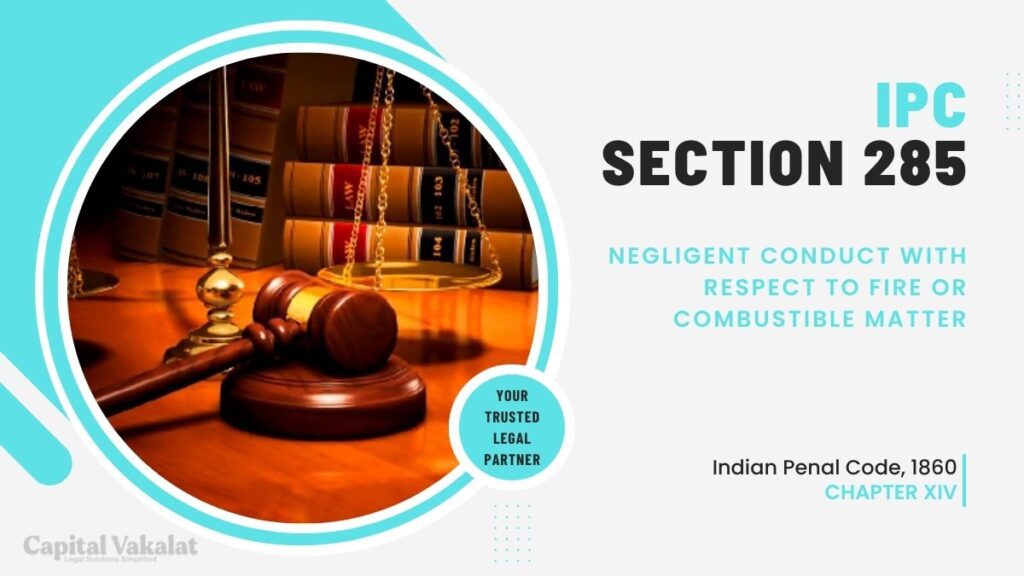In the realm of criminal law, Section 285 of the Indian Penal Code (IPC) addresses the issue of negligent conduct with respect to fire or combustible matter. This section plays a significant role in maintaining public safety and preventing accidents involving fire or flammable materials.

Understanding its provisions and implications is crucial in promoting responsible behavior and preventing potential disasters.
Understanding Negligent Conduct with Respect to Fire or Combustible Matter
Negligent conduct regarding fire or combustible matter encompasses a wide range of activities that could lead to hazardous situations. It involves situations where an individual’s actions or inaction, marked by carelessness, result in potential danger due to fire or combustible substances. Such actions may include improper storage, handling, or transport of flammable materials, leading to unforeseen incidents.
Legal Provisions under Section 285 IPC
Elements of the Offense: To establish an offense under Section 285 IPC, three key elements must be proven:
- Existence of Fire or Combustible Matter: There must be a presence of fire or combustible matter involved.
- Negligence: The defendant’s actions or inaction must demonstrate negligence, showing a lack of reasonable care.
- Endangering Human Life or Safety: The negligence should result in the endangerment of human life or safety.
Penalties: Violation of Section 285 IPC can result in imprisonment for a term that may extend to six months or a fine, or both. It is essential to note that the penalties may vary depending on the specific circumstances of the case.
Cases and Examples
Notable Cases: Several notable cases have shed light on the significance of Section 285 IPC. One such case involved a factory owner who neglected safety protocols, resulting in a devastating fire that claimed multiple lives. This case served as a wake-up call, highlighting the need for stringent adherence to fire safety regulations.
Real-life Scenarios: In everyday life, instances of negligent conduct with respect to fire or combustible matter are unfortunately not uncommon. These scenarios range from mishandling of gas cylinders in households to improper storage of hazardous chemicals in industrial settings.
Importance of Section 285 IPC
Fire Safety and Prevention: Section 285 IPC plays a pivotal role in emphasizing the importance of fire safety. It serves as a deterrent to those who might otherwise overlook safety measures, prompting them to be more cautious in their actions.
Liability and Accountability: This legal provision holds individuals accountable for their actions, fostering a sense of responsibility and accountability among the public. It sends a clear message that negligence in handling fire or combustible materials will not be tolerated.
Differences Between Negligence and Other Offenses
Comparative Analysis: Negligent conduct, as outlined in Section 285 IPC, differs from other offenses like arson or deliberate endangerment. Negligence involves carelessness and a lack of intention to cause harm, making it a distinct legal concept.
Preventive Measures and Compliance
How to Avoid Negligent Conduct: To prevent negligent conduct, individuals and organizations should prioritize fire safety protocols, including proper storage, handling, and transportation of flammable materials. Regular safety inspections can help identify and rectify potential hazards.
Reporting and Legal Procedures
Reporting an Incident: If you witness or experience an incident involving negligent conduct with respect to fire or combustible matter, it is crucial to report it promptly to the relevant authorities. This timely reporting can help prevent further harm.
Legal Proceedings: Legal procedures in such cases involve thorough investigations to determine negligence. If found guilty, the defendant may face penalties as per Section 285 IPC.
The Role of Awareness and Education
Public Responsibility: Creating awareness about the potential dangers of negligent conduct with respect to fire or combustible matter is a shared responsibility. The public must stay informed and educated about fire safety measures.
Fire Safety Training: Individuals and organizations should invest in fire safety training to ensure that people are equipped with the knowledge and skills necessary to prevent and respond to fire-related emergencies.
Conclusion
Section 285 IPC is a critical legal provision aimed at curbing negligent conduct that could lead to fire-related accidents. Its significance in promoting fire safety and public accountability cannot be overstated. By understanding and adhering to this section, we can collectively work towards a safer environment for all.
Frequently Asked Questions
What are the penalties for violating Section 285 IPC?
Penalties can include imprisonment for up to six months, a fine, or both, depending on the case’s specifics.
How can individuals prevent negligent conduct with respect to fire or combustible matter?
Preventive measures include following fire safety protocols, proper storage, and regular safety inspections.
What is the difference between negligence and other fire-related offenses?
Negligence involves carelessness without intent to harm, while other offenses like arson involve deliberate actions to cause harm.
Why is public awareness and education crucial in preventing fire-related incidents?
Public awareness and education are essential for ensuring that individuals are informed and equipped to prevent and respond to fire-related emergencies.